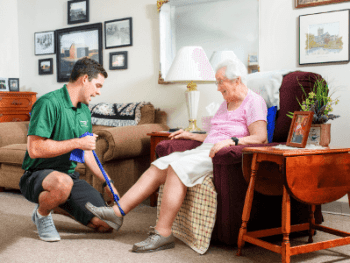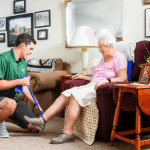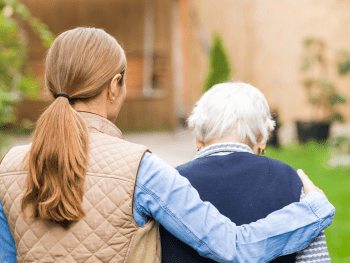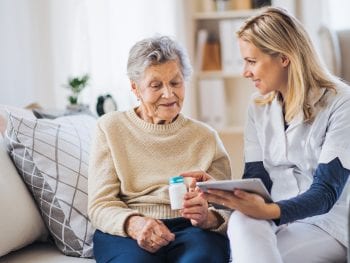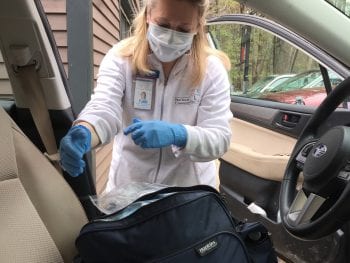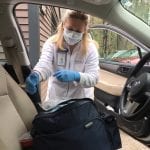Pemi-Baker Hospice & Home Health is committed to serving our patients in New Hampshire and keeping you informed about local updates with respect to COVID-19.
Your safety is our priority, and our infection control team is continuing to ensure that patients can continue to receive safe and exceptional home health care.
- PBH&HH has not altered our operations but are conducting screenings according to the recommendations of the Center for Disease Control and Prevention (CDC).
- Pemi-Bakers’ Mask and Protection Policy states that all staff members shall wear non-fit tested KN95/N95 masks when in patients’ homes. Staff are self-assessing daily and when working with known or suspected COVID cases wearing full PPE (fit-tested N95 masks, gown, gloves, eye protection and booties).
- All staff must be fully vaccinated against COVID-19, with allowable exemptions.
As members of your local community, we strive to act in the best interests of patient, employee, and community by complying with CDC guidelines and taking precautions as necessary. We have assembled the following resources to help you stay informed and protect yourself, with additional links at the bottom of this page: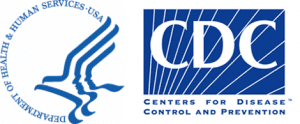
- Center for Disease Control and Prevention: Coronavirus 2019
- NH Covid-19 Response & Tests
- Find a Covid-19 Vaccine or Booster
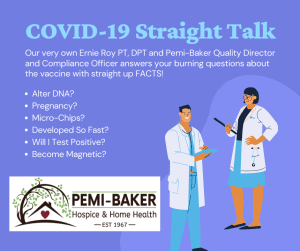
COVID-19 Vaccination Straight Talk-Weekly Comments/Questions Answered by Ernie Roy, PT, DPT, Quality Director
As you all likely aware, our community and our nation has had a roller coaster ride with respect to the COVID-19 pandemic. The initial roll-out of the COVID vaccines was able to reach a lot of people. The hope was that by this spring and early summer, we could see a substantial drop in the number of cases; maybe start to feel like we were winning the fight to get COVID 19 under control.
Unfortunately, the rate of people getting vaccinated started to really slow down at that point. Some people began feeling like the pandemic was over, while businesses, towns and states relaxed many protective measures. Other people had concerns about whether or not they should get one of the vaccines. And then the latest variations of COVID 19 (the Delta/Omicron variant) started to spread like wildfire. We thought we were out of the woods, but now we find ourselves back in a real battle.
So what can we do? Our best defense, and our best chance to turn the tide in this battle, is for as many people as possible to get vaccinated. That’s not as easy as it sounds. I’d like to present some common concerns that people have expressed about COVID-19 vaccines and present information that may help those still undecided to make an informed choice. Here’s the first couple of frequently heard concerns:
- “I don’t feel good about taking a vaccine that was developed so fast.” The COVID vaccine WAS developed a lot faster than some of the more well- known ones from the past. For example, Dr Jonas Salk needed almost 7 years to develop the polio vaccine that he introduced back in 1953. But think about that. What else do we still do the same as in 1953? Medical technology is vastly advanced now compared to back then. Our generations are benefiting from things that were not even dreamed of in the 1950’s. The COVID vaccines have actually been far more thoroughly studied than many of the vaccines we have all taken as kids or had our kids get. Well over 100,000 people were enrolled in the initial trials for the Moderna, Pfizer, and J&J COVID-19 vaccines. Vaccine trials for those under age 12 are underway, and this comes none too soon. The American Academy of Pediatrics reported over 4 million US adolescents and children have tested positive for COVID-19 since the start of the pandemic. Sadly, over 300 fatalities due to COVID have occurred in the US among teens and younger children.
- “I hear of people who got vaccinated still getting COVID-do these vaccines even work?” Yes, they do work, and they work very well. While NO vaccine ever developed was 100% fool proof, we now know that around 98% of the people getting seriously sick or dying from COVID 19 are UNVACCINATED. On average, the annual flu vaccine reduces the risk of getting the flu by around 40-60% overall, so our COVID vaccines are actually doing very well overall. There are “breakthrough” cases of fully vaccinated people who get COVID. That sort of thing has happened with every vaccine ever developed. But the overwhelming majority of people who get fully vaccinated either do not get sick, or experience no/mild symptoms if they do test positive for COVID-19. In living creatures, we almost never have certainty. Instead we have probability. I don’t play poker, but if I did, I’d play a hand that was 98% in my favor every single time.
- “What about pregnant women? I’m not sure if the vaccine is safe for them or their babies.” There has been no evidence in clinical trials or studies that pregnant women who were vaccinated had any increase in the rate of miscarriage or complications. On August 9th a statement was issued by over a dozen leading women’s and children’s health care groups, including the American Academy of Pediatrics and the American College of Obstetricians and Gynecologists. The statement reads, in part, : “As the leading organizations representing experts in maternal care and public health professionals that advocate and educate about vaccination, we strongly urge all pregnant individuals—along with recently pregnant, planning to become pregnant, lactating and other eligible individuals—to be vaccinated against COVID-19.” A study in Journal of the American Medical Association last month found only about 24% of pregnant women were vaccinated. The same study also found that COVID hospitalizations in pregnant women were almost all occurring among those who were not vaccinated. Unvaccinated women who contract COVID turn out to be 22 times more likely to have a pre term birth and 15 times more likely to die than pregnant women who were not infected by COVID. In addition to the protection against the disease that vaccination gives mom, studies have shown that babies born to vaccinated moms come pre-equipped with COVID antibodies. This means they start life with at least some added protection against this disease.
- “Can the vaccine cause me to become infertile or have trouble getting pregnant?” Research on a wide variety of vaccines, including the COVID-19 vaccines, has shown no evidence that any vaccines lead to a loss of fertility in women or men who receive them, including people of adolescent age. The source of this rumor about infertility and the COVID vaccines appears to come from a concern expressed in late 2020 by a German epidemiologist who wrote a paper theorizing that there might be some similarity between one of the placenta proteins in females and one of the proteins in the COVID virus. He questioned whether vaccination against the COVID proteins would cause a woman’s immune system to react against her own placenta proteins. Turns out, any degree of similarity between the protein molecules in the placenta and those in the COVID virus are so small as to be meaningless. Studies on both vaccine trial volunteers and recovered COVID patients have borne this out. Those studies (including millions of people due to the high rate of COVID infections) clearly shows no differences in rates of conceiving between those with antibodies to COVID-19 and those without.
- “I hear it’s better to get immunity naturally by getting COVID and recovering.” Actually, research shows that the COVID vaccines stimulate your immune response much better than getting the disease does. Research published by the Nebraska Medical Center emphasized the following points: More than a third of COVID-19 infections result in zero protective antibodies. Natural immunity fades faster than vaccine immunity. Why is this? A lot of it has to do with the fact that there is a great variation in how different people’s immune systems react to infection. Some respond pretty well, some hardly at all. Controlled vaccine doses give a much more consistent level of protection. Countries, such as Iran and Brazil, who have tried getting “herd immunity” by doing very little vaccination have failed miserably, with their high infection rates doing nothing to prevent waves of recurrent COVID virus. If you had COVID 19, studies show your immune response lasts only about 90 days on average, while vaccine gives at least 6-8 months of high level protection against severe illness.
- “Could I get COVID from the vaccine?” The way the vaccines are constructed makes it impossible to get COVID from a COVID vaccine. The vaccine does not contain live COVID. Period. Getting the vaccine may give you some mild symptoms that remind you of early stages of flu. This is especially true for the 2 shot vaccines. Many people report having a few days of fatigue, general achy feelings, or a low grade temperature. This DOES NOT MEAN YOU GOT COVID-19 FROM THE VACCINE. This is the normal response of your body as it ramps up the immune system because the vaccine stimulated your body to start making its own natural antibodies against COVID-19. It means the vaccine is working and preparing your body to fight back if you get exposed to actual COVID-19.
- “If I get vaccinated, would that cause me to test positive for COVID-19 later on?” No, a test for the COVID-19 virus will not turn up positive if you have been vaccinated previously. The COVID vaccines do not contain any live virus and cannot cause you to develop COVID-19, therefore, simply being vaccinated against COVID-19 will not cause you to test positive for the disease. If you were to take an antibody test some time down the road, your test may show the presence of antibodies to COVID-19. This is because the vaccines ARE designed to get your immune system ready to fight off a potential COVID-19 infection. They do this by helping your own immune system make antibodies against the disease. So you WANT to have those antibodies circulating in your body. They are one of your first and best lines of defense.
- “I saw something on an internet chat about the government secretly putting microchips in the vaccines to track people. Could that be true?” Not even a chance that something of that nature might be true. There are no microchips being secretly placed in the COVID-19 vaccines. This is a great example of how disinformation can rapidly spread via social media in the 21st There a few theories about how this rumor began. For the most part, it seems to have involved comments made by high profile individuals such as Bill Gates, concerning how one day, it might be possible to carry our health records on an e-card. These sorts of comments were then picked up and spun by some other folks, naturally altering the content to suit their own particular purposes. Moral of the story, if the government wanted to track you, wouldn’t it be a lot easier to follow your cell phone, internet activity, bank account, tax records, or all the other methods that have been available for years?
- “I tested positive 3 weeks ago for COVID-19, and was told by my neighbor that I have to wait at least 3 months after recovering to get the COVID-19 vaccine-is that true?” According to the latest guidance from the CDC, if you have tested positive, you can vaccinated against COVID-19 as soon as you have met the criteria to stop isolating. For most individuals, this is “10 days after symptom onset and after resolution of fever for at least 24 hours and improvement of other symptoms.” (1). There are a couple of exceptions to this however. If you were diagnosed with COVID-19 and required treatment with monoclonal antibodies or convalescent plasma, you should wait 90 days before getting vaccinated against COVID-19. Don’t worry if you are not sure what your treatment regimen consisted of. Your PCP can easily provide that information to you. In addition, if you were diagnosed with multisystem inflammatory syndrome (MIS), CDC recommends you wait 90 days after being diagnosed with MIS before getting your COVID vaccine.
- “I do want to get my COVID vaccine but I also need to get my flu shot- how long do I have to wait after getting one vaccine before I can get the other?” The CDC guidance on administration of COVID-19 vaccines and other vaccines is that a person can receive both the flu vaccine and COVID-19 vaccine safely at the same visit.
There are lots of good reasons to get vaccinated. You’ll be protecting yourself, your friends and family members. You’ll be helping your town, state and nation. The more people who are vaccinated, the less the disease spreads. The less it spreads, the quicker it can be brought under control. This is exactly how we brought polio, small pox, diphtheria, and other diseases under control. The less COVID cases there are, the more our schools can stay open, the more people will get their jobs back, the more of our favorite activities can resume, the less people will needlessly lose their lives.
I totally understand why people may have concerns. That’s only natural. If you are unsure about getting vaccinated, talk to your health care provider. You have trusted them to take care of you all along. Why not trust them to give you the straight truth about getting vaccinated against COVID? In the meantime, here are some links to accurate information on this topic. Check it out.
CDC. FAQ about COVID-19 Vaccination
NH DHHS Coping with COVID-19 Vaccine Stress
CDC 14 Diseases You Almost Forgot About (Thanks to Vaccines)






